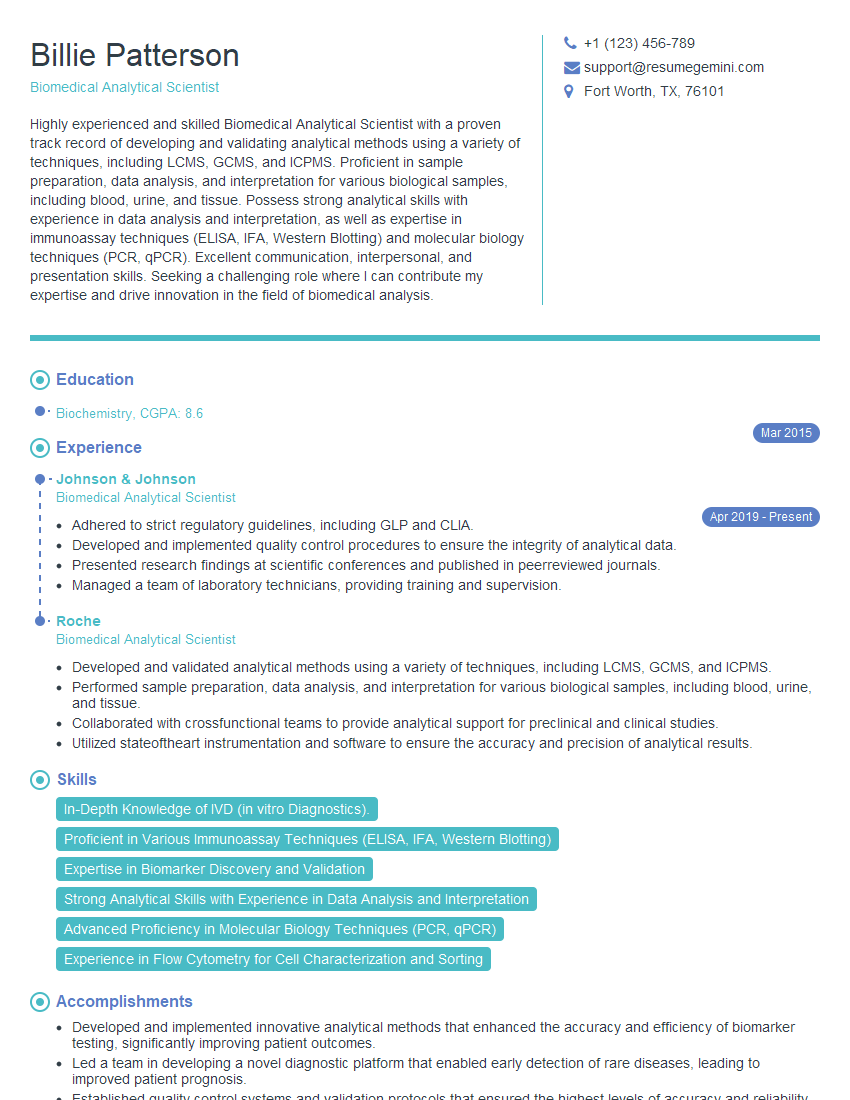Are you a seasoned Biomedical Analytical Scientist seeking a new career path? Discover our professionally built Biomedical Analytical Scientist Resume Template. This time-saving tool provides a solid foundation for your job search. Simply click “Edit Resume” to customize it with your unique experiences and achievements. Customize fonts and colors to match your personal style and increase your chances of landing your dream job. Explore more Resume Templates for additional options.

Billie Patterson
Biomedical Analytical Scientist
Summary
Highly experienced and skilled Biomedical Analytical Scientist with a proven track record of developing and validating analytical methods using a variety of techniques, including LCMS, GCMS, and ICPMS. Proficient in sample preparation, data analysis, and interpretation for various biological samples, including blood, urine, and tissue. Possess strong analytical skills with experience in data analysis and interpretation, as well as expertise in immunoassay techniques (ELISA, IFA, Western Blotting) and molecular biology techniques (PCR, qPCR). Excellent communication, interpersonal, and presentation skills. Seeking a challenging role where I can contribute my expertise and drive innovation in the field of biomedical analysis.
Education
Biochemistry
March 2015
Skills
- In-Depth Knowledge of IVD (in vitro Diagnostics).
- Proficient in Various Immunoassay Techniques (ELISA, IFA, Western Blotting)
- Expertise in Biomarker Discovery and Validation
- Strong Analytical Skills with Experience in Data Analysis and Interpretation
- Advanced Proficiency in Molecular Biology Techniques (PCR, qPCR)
- Experience in Flow Cytometry for Cell Characterization and Sorting
Work Experience
Biomedical Analytical Scientist
- Adhered to strict regulatory guidelines, including GLP and CLIA.
- Developed and implemented quality control procedures to ensure the integrity of analytical data.
- Presented research findings at scientific conferences and published in peerreviewed journals.
- Managed a team of laboratory technicians, providing training and supervision.
Biomedical Analytical Scientist
- Developed and validated analytical methods using a variety of techniques, including LCMS, GCMS, and ICPMS.
- Performed sample preparation, data analysis, and interpretation for various biological samples, including blood, urine, and tissue.
- Collaborated with crossfunctional teams to provide analytical support for preclinical and clinical studies.
- Utilized stateoftheart instrumentation and software to ensure the accuracy and precision of analytical results.
Accomplishments
- Developed and implemented innovative analytical methods that enhanced the accuracy and efficiency of biomarker testing, significantly improving patient outcomes.
- Led a team in developing a novel diagnostic platform that enabled early detection of rare diseases, leading to improved patient prognosis.
- Established quality control systems and validation protocols that ensured the highest levels of accuracy and reliability in clinical laboratory testing.
- Developed a wearable biosensor that enabled realtime monitoring of vital biomarkers, revolutionizing personalized medicine.
- Led a multidisciplinary team in the deployment of an advanced analytical laboratory that significantly accelerated drug discovery efforts.
Awards
- Recipient of the American Chemical Societys Excellence in Analytical Chemistry Award for outstanding contributions to the field.
- Recognized with the Society for Laboratory Automation and Screenings Early Career Scientist Award for advancements in highthroughput screening technologies.
- Awarded the prestigious Beckman Coulter Innovation Award for exceptional contributions to clinical diagnostics through the development of advanced analytical instruments.
- Recipient of the European Society of Analytical Chemistrys Young Scientist Award for groundbreaking work in the field of proteomics.
Certificates
- Certified Medical Laboratory Scientist (MLS)
- ISO 13485:2016 Quality Management System Auditor Certification
- IVD Quality Assurance and Regulatory Affairs Specialist Certification
- Certified Six Sigma Green Belt
Career Expert Tips:
- Select the ideal resume template to showcase your professional experience effectively.
- Master the art of resume writing to highlight your unique qualifications and achievements.
- Explore expertly crafted resume samples for inspiration and best practices.
- Build your best resume for free this new year with ResumeGemini. Enjoy exclusive discounts on ATS optimized resume templates.
How To Write Resume For Biomedical Analytical Scientist
- Showcase your expertise in analytical techniques and data interpretation.
- Highlight your experience in biomarker discovery and validation, as well as molecular biology techniques.
- Emphasize your strong analytical skills and ability to interpret complex data.
- Quantify your accomplishments and provide specific examples of your contributions.
Essential Experience Highlights for a Strong Biomedical Analytical Scientist Resume
- Developed and validated analytical methods using LCMS, GCMS, and ICPMS techniques.
- Performed sample preparation, data analysis, and interpretation for various biological samples.
- Collaborated with cross-functional teams to provide analytical support for preclinical and clinical studies.
- Utilized state-of-the-art instrumentation and software to ensure the accuracy and precision of analytical results.
- Adhered to strict regulatory guidelines, including GLP and CLIA.
- Developed and implemented quality control procedures to ensure the integrity of analytical data.
Frequently Asked Questions (FAQ’s) For Biomedical Analytical Scientist
What is the role of a Biomedical Analytical Scientist?
A Biomedical Analytical Scientist is responsible for developing and validating analytical methods, performing sample preparation, and analyzing and interpreting data to identify and quantify biomarkers for use in clinical diagnostics and research.
What are the educational requirements for a Biomedical Analytical Scientist?
A Bachelor’s degree in Biochemistry, Chemistry, or a related field is typically required, along with experience in analytical chemistry and laboratory techniques.
What are the key skills for a Biomedical Analytical Scientist?
Strong analytical skills, proficiency in various analytical techniques, experience in data analysis and interpretation, and knowledge of regulatory guidelines are essential.
What are the career prospects for a Biomedical Analytical Scientist?
Biomedical Analytical Scientists can advance to leadership roles in laboratory management, research and development, or regulatory affairs.
How can I become a successful Biomedical Analytical Scientist?
Gain a strong educational foundation in analytical chemistry and laboratory techniques, develop expertise in various analytical techniques, and stay updated with advancements in the field.
What are the challenges faced by Biomedical Analytical Scientists?
Keeping up with rapidly evolving technologies, ensuring the accuracy and reliability of analytical results, and meeting regulatory requirements are some of the challenges faced by Biomedical Analytical Scientists.